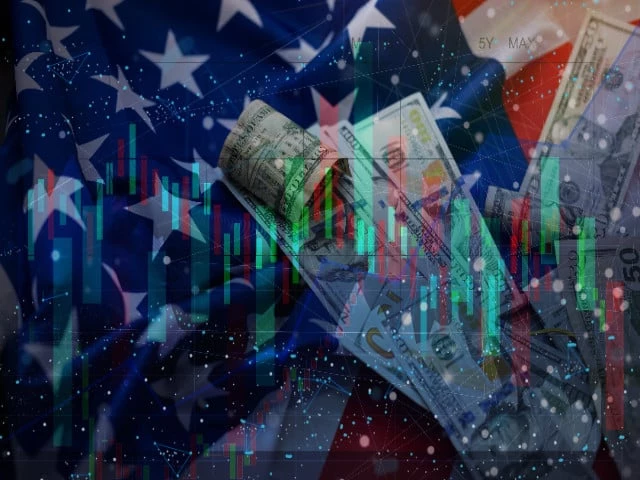US economy flirts with recession
Rising prices, weak job growth and political interference raise recession alarms

Just days after President Donald Trump fired the head of the agency responsible for producing job figures, the dreaded "R-word" is back on the lips of economists and experts, as fears of recession grip Washington — this time with little hope of a Fed bailout.
For many, the scene feels all too familiar, echoing warnings from Greece and Argentina, where official statistics lost credibility amid government pressure to massage the numbers.
Pressured to spin data in the president's favour, experts reveal cracks in the US economy. Soaring tariffs, tightening policies, and weak demand have left the recovery running on fumes.
Moody's Chief Economist Mark Zandi has already warned that the US economy was on the "precipice of recession," blaming rising tariffs and strict immigration rules.
Meanwhile, the Commerce Department reported a 3% annualised GDP growth for Q2, but experts say it was mostly driven by import rushes to avoid tariffs, hiding a slowing domestic economy. With weak consumer spending and faltering business investment, economists see the US economy stalling.
Similarly, labour market evidence is also dismaying as July's jobs report recorded only 73,000 new payrolls (far below the 110,000 expected) and steep downward revisions to May-June, prompting Fed rate cut forecasts.
'Phoney war'
The most immediate culprit is the trade war. Since April, Trump has imposed broad new tariffs on dozens of trading partners, claiming they would shrink the US trade deficit. In practice, businesses and consumers are feeling the pinch.
The tariff war has entered what experts are identifying as a "phoney war" phase, a period of uneasy calm following the initial shock and headline-grabbing tariff escalations.
"There are early indications, and strong reasons to believe, that the real damage is yet to come and that the US is entering a period of stagflation that will lead to a recession by the end of this year," DeAnne Julius, Senior Adviser to Chatham House, warned back in May.
Economists warn tariffs will hit company profits and raise prices for shoppers. Toyota's US profits fell 37% in Q2 due to tariffs, while GM and Ford expect billion-dollar costs in 2025. Retailers like Walmart warned in May that they'll raise prices on items "from bananas to children's car seats".
Analysts estimate Americans will pay about 18% more for imports because of the tariffs. Morgan Stanley's Ellen Zentner noted in mid-July that June's 0.3% CPI increase was "the first of greater price pressures to come".
A K-shaped recovery
Several observers note that the harm is uneven. Washington Post columnist and Navy Federal Credit Union Chief Economist Heather Long dubs it a return to a "K-shaped economy", where a tiny slice of big firms and wealthy households powers the country while everyone else is squeezed.
"The economy is increasingly dependent on a small sliver of superstar companies and wealthy consumers to stay afloat because these are the only firms and families able to withstand the tariff onslaught. A highly concentrated economy increases the risk of a downturn — and will leave many middle-class Americans frustrated and strained," she wrote.
In recent months, the top 10-20% of earners (those with income above roughly $250,000) have maintained robust spending — buoyed by stock-market gains and a rebound in high-end assets — whereas middle- and lower-income households have flatlined.
Moody's Mark Zandi notes that "the top 20% of households continue to grow their spending" while the bottom 80% are only keeping pace with inflation. Crucially, economists say tariff hikes will worsen this divide. Lower-income consumers, who spend a larger share of income on imports like electronics, clothing and food, will feel the price hikes most acutely.
In contrast, many of America's largest firms and wealthiest shoppers can better weather higher costs. As The Washington Post points out, a handful of tech giants and big banks now drive headline growth — tech stock gains and luxe spending mask the pain felt by everyone else.
CEPR Economist Dean Baker warns that Trump's trade war will result in Americans "pay[ing] more money for inferior American products" with only "modest" manufacturing job gains, while vibrant sectors like biotech and clean energy are "gutted".
Meanwhile, Trump's move to suppress factual information threatens the long-standing American tradition of impartial and trustworthy data collection, a cornerstone of the nation's economic stability and global credibility.
On Substack, Ruth Ben-Ghiat, a historian specialising in authoritarian regimes, cited fascist Italy as an example, noting how Mussolini "pioneered the politicisation of economic research" to "glorify" his dictatorship.
Some critics allege the labour statistics are "rigged" for political purposes. (President Trump publicly accused the BLS of "manipulating" the numbers and promptly fired Commissioner Erika McEntarfer after the July report).
However, independent observers stress the revisions reflect normal methodology, not malfeasance. PolitiFact confirmed there was "no evidence of partisan rigging" of the data. In fact, large benchmark corrections happened recently in both parties' presidencies.
As former BLS officials warned in a joint statement, firing a commissioner over routine revisions "undermines the credibility of federal economic statistics" — the very "cornerstone of intelligent economic decision-making".
The writer is a Lahore-based senior journalist








1733130350-0/Untitled-design-(76)1733130350-0-208x130.webp)











COMMENTS
Comments are moderated and generally will be posted if they are on-topic and not abusive.
For more information, please see our Comments FAQ